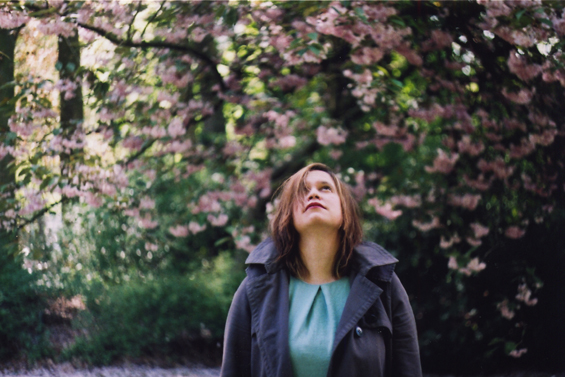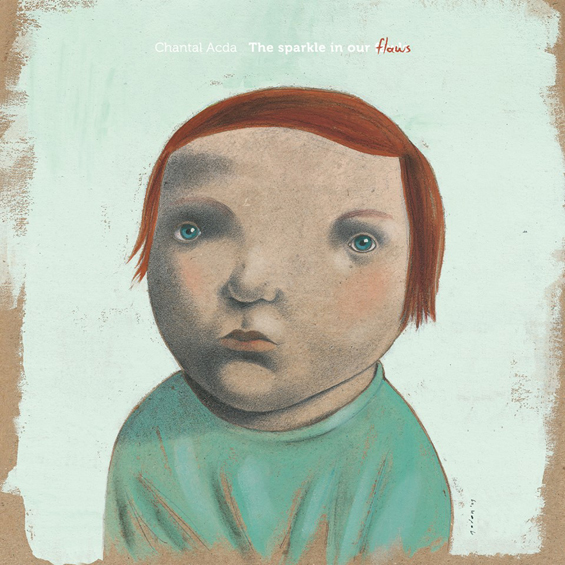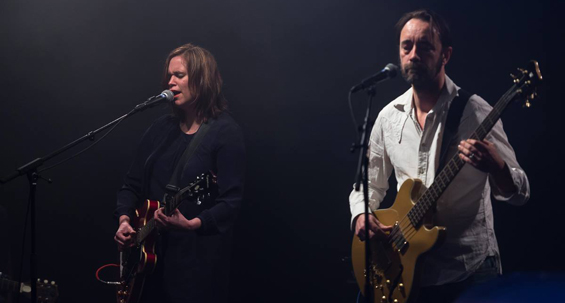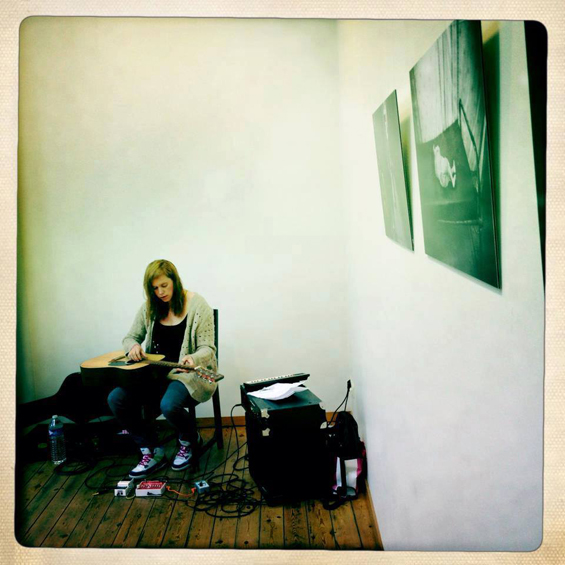

photo: Terry Magson
TEN QUESTIONS WITH CHANTAL ACDA
Currently based in Belgium, Chantal Acda (b. 1978) has been involved in a number of collaborative projects over the years, among them Distance, Light & Sky, which partners her with Chris Eckman and Eric Thielmans, and Sleepingdog, her well-known project with Adam Wiltzie (Stars of the Lid, A Winged Victory For The Sullen). But it's on her recent solo albums, 2013's Let Your Hands Be My Guide and the just-released The Sparkle in Our Flaws, that the Dutch-born Acda has perhaps most fully revealed herself, and the songs featured on the recordings constitute some of the most powerful and emotionally compelling music she's ever created. We had the pleasure of speaking with her recently about the solo albums, the critical contributions Peter Broderick and Shahzad Ismaily made to them, and the status of other group projects with which she's involved.
1. As much as I'm impressed by the material you released before Let Your Hands Be My Guide, it feels to me as if a personal breakthrough of sorts was achieved on that album and your latest one. Am I completely off-the-mark, or does it strike you too as a breakthrough, and if it does, in what ways does it do so—is it the songwriting, the emotional depth?
It definitely is for me. I was always sort of hiding behind very strong characters. I just thought I wasn't strong enough to do things on my own; I didn't want to even put my name out there so clearly. With Let Your Hands Be My Guide I started a new process and liberated myself from the things I thought I was lacking. For example, I know nothing about the notes I play. I can't read them and can't translate them to the people I work with. That always felt like a weakness, but I now see that it actually was my strength because it made me an instinctive musician. It was liberating to also let go the fact that I'm an up and down person; my mood swings have always been very present. My head gets full quickly with input, and I was always fighting this to be able to find my place in this world. I stopped that fight—some sort of self-acceptance, I guess. And I felt that in my voice, too. A voice is so connected to our feelings, and it felt as if I was able to liberate my vocals and not feel blocked.
2. Peter Broderick and Shahzad Ismaily have both figured prominently in the creation of the two albums. Can you elaborate a bit on how each one contributed to the projects and the difference each made to the finished result? Relatedly, the album sleeve indicates that Valgeir Sigurdsson, Heather Woods Broderick, Niels Van Heertum, and Eric Thielemans contributed to The Sparkle in Our Flaws, without clarifying what exactly they did. In what ways did they contribute to the album?
Well, Peter and Shahzad are soulmates. They are outstanding as people but also as musicians. I choose the people I work with very carefully; there needs to be this deep connection and understanding. In that way we didn't have to use a lot of words to record the album. Shahzad has been one of the most important persons for getting me to believe in myself and to follow that path. Peter has given me so much joy, understanding, and freedom. The three of recorded all the basic material; the others added colour and made the worlds of the songs wider.

3. Certain things obviously are common to Let Your Hands Be My Guide and The Sparkle in Our Flaws. What, on the other hand, do you see as the key differences between them?
To me they both reflect a very important phase of my life and of my music life; I'm fond of both of them. I can hear now that on Let Your Hands Be My Guide I was at the beginning of my research and was inside my heart and emotions. On The Sparkle in Our Flaws I make a connection with the world. Less just me; more the struggles, questions, and love we are surrounded with.
4. Is there an overriding theme to The Sparkle in Our Flaws and if so what would you say it is?
Connecting with the world and including all my flaws and dark sides without me feeling heavy. How to stop controlling and surrender myself instead of fighting. Also connecting with others and my view of this world.
5. Are you more the kind of songwriter who writes when inspiration strikes as opposed to the kind who sits down each morning from 9 to 12 and hunkers down to create something regardless of the degree of inspiration at hand? How do your songs come into being and from what do you draw inspiration? Do lyrics come first and music second, or do they develop together?
I'm the kind that doesn't even know I'm writing a song. I feel it coming up. I grab an instrument and then it just comes out. Ten minutes later I'm wondering where it came from and what happened. My inspiration can be anything, just all things coming on my path, but it always seems to arrive when I feel fragile and my heart is open.

6. I'm imagining you're someone who draws inspiration from not just music but other art forms, too. What artworks, musical and otherwise, have been particularly central to your development?
I can get very inspired by any form of theatrical approach—a dance, a play, performance. Anything that puts my heart open, really; anything that puts me in a mood where I stop to think, judge, or guess.
7. Mood is such a fragile thing. How difficult is it to create a certain mood in the studio for a given song, and what do you do to nurture it?
I nurture it by being very careful with whom I work. I need to be and feel safe--have sensitive souls around me, I guess. Then the moods come naturally.
8. What for you would be an example of a “perfect song” by another artist (and why)?
It all has to do with surrender. If I hear that's present, it almost becomes a spiritual experience, and then I am most of the time totally into it.

9. You, Chris Eckman, and Eric Thielmans released an album in 2014 under the Distance, Light & Sky name called Casting Nets, and you paired up with Craig Ward in recent years to release two albums as True Bypass. What's the status of those projects as well as Sleepingdog, your project with Adam Wiltzie?
Distance, Light & Sky is not a project but became a real band; we are going to record a second album in the springtime. The other projects are not running right now, but it doesn't mean they won't in the future.
10. I asked Peter Broderick a similar question in my recent interview with him, but it seems like a relevant one to put to you as well. As you've been playing and performing for a number of years now, I'm wondering what thoughts you might have on the evolution your own music has undergone since you started out. And is there anything you now know that you wish you'd known at the outset?
Fear is gone now, and besides that my music is reflecting my life. It's good to know things at the right moment, not earlier or later, and for that I needed reflection and time. So there is nothing I needed to know earlier and a lot still to learn. And I'm not frustrated finally about that last fact. I am ready to walk the path of life with my voice, with the place I call my home. Music is my home, and I want it to travel the bumpy ride with me. If I make sure I'm safe with the people surrounding me, then I have faith that the right knowledge will reach me at the right time.November 2015![]()